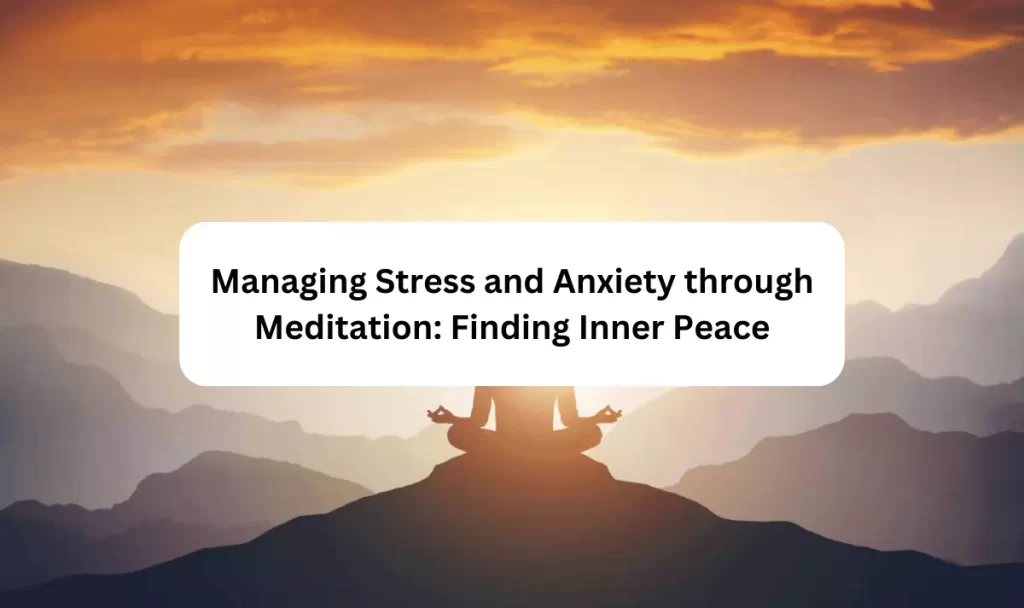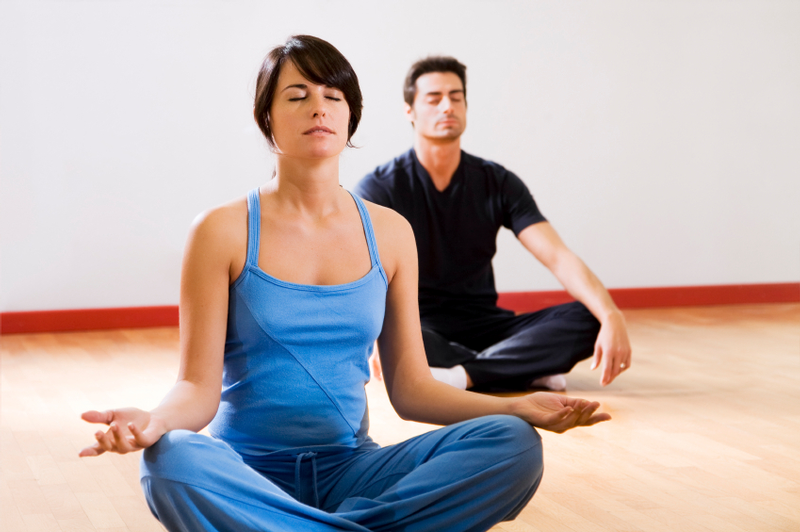
In today’s fast-paced and demanding world, stress and anxiety have become common experiences for many individuals. The constant pressure to perform, meet deadlines, and navigate through various challenges can take a toll on our mental well-being. Thankfully, there are effective ways to manage and alleviate stress and anxiety. One such powerful tool is meditation. In this blog post, we will explore the benefits of meditation and how it can help us find inner peace amidst the chaos of everyday life.
Content
Understanding Stress and Anxiety

Stress and anxiety are natural responses to demanding situations or perceived threats. While a certain level of stress can be motivating, chronic stress and anxiety can have detrimental effects on our mental, emotional, and physical health. It is crucial to recognize the signs and symptoms of stress and anxiety to address them effectively.
The Power of Meditation
Meditation is an ancient practice that involves training the mind to achieve a state of calmness and clarity. Through focused attention or mindfulness, meditation helps to quiet the constant chatter of our thoughts and cultivate a deep sense of inner peace. Scientific research has shown that regular meditation practice can positively impact our brain and body, reducing stress, anxiety, and even improving overall well-being.
Getting Started with Meditation
Embarking on a meditation journey doesn’t require any special equipment or prior experience. Here are a few simple steps to get started:
Find a quiet and comfortable space where you won’t be disturbed.
Sit in a relaxed position, either on a cushion or a chair, with your spine upright.
Close your eyes and take a few deep breaths to center yourself.
Gently bring your attention to the sensation of your breath, focusing on the inhales and exhales.
Allow your thoughts to come and go without judgment, gently guiding your attention back to the breath whenever you notice your mind wandering.
Mindfulness Meditation Techniques
Mindfulness meditation is one of the most widely practiced forms of meditation. It involves paying non-judgmental attention to the present moment, bringing awareness to our thoughts, feelings, and bodily sensations. Here are a few mindfulness techniques to incorporate into your practice:
Body Scan Meditation

This technique involves systematically scanning your body from head to toe, noticing any areas of tension or discomfort, and consciously releasing them.
Loving-Kindness Meditation
Loving-kindness meditation focuses on developing feelings of compassion and love towards oneself and others. It involves silently repeating loving and kind phrases, such as “May I be happy, may I be peaceful, may I be healthy.”
Guided Meditation for Stress Relief
Guided meditation is an excellent option for beginners or those who prefer structured sessions. It involves following an audio recording or a meditation app that provides step-by-step guidance through the practice. These guided sessions often focus on relaxation, stress relief, and cultivating positive emotions.
Benefits of Meditation for Mental Health
Regular meditation practice offers a wide range of benefits for mental health:
- Reduces stress and anxiety levels
- Improves focus and concentration
- Enhances emotional well-being and resilience
- Promotes better sleep and relaxation
- Increases self-awareness and self-compassion
- Fosters a sense of inner peace and balance
- Incorporating Meditation into Your Daily Routine
To reap the full benefits of meditation, it is essential to make it a consistent part of your daily routine. Here are a few tips to help you establish a regular practice:
Start with short sessions: Begin with just a few minutes of meditation each day and gradually increase the duration as you become more comfortable.
Choose a specific time: Find a time that works best for you, whether it’s early morning, during lunch breaks, or in the evening before bed.
Create a peaceful environment: Set up a dedicated space for meditation, free from distractions and clutter.
Experiment with different techniques: Explore various meditation styles and techniques to find what resonates with you the most.
Be gentle with yourself: Remember that meditation is a practice, and it’s normal for the mind to wander. Be patient and compassionate with yourself as you cultivate mindfulness.
Overcoming Common Challenges in Meditation
While meditation offers numerous benefits, it is not always easy to maintain a consistent practice. Here are some common challenges and tips to overcome them:
Restless Mind
If your mind feels restless during meditation, acknowledge the thoughts without getting attached to them. Redirect your attention back to your breath or the present moment.
Impatience
Impatience is a common challenge, especially for beginners. Remind yourself that progress takes time, and each meditation session contributes to your overall well-being.
Physical Discomfort

If you experience physical discomfort, such as an achy back or stiff muscles, make adjustments to your posture or try a different sitting position. Incorporating gentle stretching or yoga exercises before meditation can also help alleviate physical tension.
Cultivating a Positive Mindset through Meditation
Meditation not only helps to manage stress and anxiety but also cultivates a positive mindset. By regularly practicing mindfulness and self-compassion, we can reframe negative thoughts, foster gratitude, and embrace a more optimistic outlook on life.
Deepening Your Meditation Practice
As you progress in your meditation journey, you may wish to explore more advanced techniques to deepen your practice. Consider the following options:
Silent Meditation: Gradually increase the duration of silent meditation sessions, allowing for more extended periods of uninterrupted focus.
Mantra Meditation: Incorporate the repetition of a specific word or phrase during your meditation practice to enhance concentration and mindfulness.
Walking Meditation: Engage in mindful walking by paying attention to the sensations of each step, the environment, and your body’s movement.
Nurturing Emotional Well-being with Meditation
Emotional well-being is closely tied to our ability to manage stress and anxiety effectively. Through meditation, we can develop emotional resilience and cultivate a greater sense of calmness and peace within ourselves.
Enhancing Self-Awareness through Meditation
Self-awareness is a vital aspect of personal growth and self-improvement. By practicing meditation, we can develop a deeper understanding of our thoughts, emotions, and patterns of behavior. This heightened self-awareness allows us to make conscious choices and create positive changes in our lives.
Meditation Retreats and Resources
For those seeking a more immersive meditation experience or guidance from experienced practitioners, meditation retreats can provide a transformative environment. Additionally, there are numerous online resources, meditation apps, and communities that offer guided sessions, courses, and supportive networks to help you along your meditation journey.
Taking a Holistic Approach to Stress Management
While meditation is a powerful tool for managing stress and anxiety, it is essential to adopt a holistic approach to overall well-being. Incorporating other stress-reducing practices such as regular exercise, healthy eating, sufficient sleep, and engaging in hobbies or activities that bring joy can complement and enhance the benefits of meditation.
Conclusion
In conclusion, managing stress and anxiety through meditation is a potent and accessible method for finding inner peace. By dedicating time to practice meditation consistently, we can reduce the negative impact of stress, cultivate mindfulness, and nurture our mental well-being. Remember to be patient and kind to yourself throughout the process, and embrace the transformative power of meditation in your life.
u003cstrongu003eHow long should I meditate each day?u003c/strongu003e
The duration of meditation can vary based on individual preferences and schedules. Start with a few minutes and gradually increase the duration as you become more comfortable.
u003cstrongu003eCan meditation cure anxiety and stress?u003c/strongu003e
While meditation cannot cure anxiety and stress, it can significantly reduce their impact and help individuals develop effective coping mechanisms.
u003cstrongu003eIs meditation suitable for everyone?u003c/strongu003e
Yes, meditation is suitable for people of all ages and backgrounds. However, individuals with certain mental health conditions should consult with a healthcare professional before starting a meditation practice.
u003cstrongu003eCan I meditate lying down?u003c/strongu003e
While it’s possible to meditate lying down, it is generally recommended to sit upright to maintain focus and prevent falling asleep.
u003cstrongu003eHow long does it take to experience the benefits of meditation?u003c/strongu003e
The benefits of meditation can be experienced immediately, such as increased relaxation. However, long-term and more profound benefits usually emerge with consistent practice over time.

Helen Bradley is a health blogger and the founder of her own blog about fitness. She has been blogging for three years now and loves to share what she learns with others. Helen enjoys reading, cooking, and staying active outdoors.





